You’re in the spotlight, center stage, the star of the school play. Errrrk… wait a minute! First, you’ll have to try out to get that big role. Here’s how to audition like a pro.
Preparation can really make a difference in landing a part. Read the entire play before the audition. Reading the lines aloud will help you practice acting the characters.
Ask the director for a copy of the play. If the director can’t give you a copy, your local or school library may be able to help. If the library doesn’t carry a copy of the script, ask the librarian if the play is based on a book available at the library. Many plays have even been made into movies you can check out from the library to watch.
Read the audition notice so you’ll know what will be expected of you at the audition. It will usually be one of the following three things:
1. Most of the time, the director will ask the actors to do a cold reading. This simply means reading a scene from the play at the audition. The director may hand out the scene in advance or will give it to the actors at the audition. The purpose of a cold reading isn’t to test how quickly you can memorize or how well you read. If you try to memorize on short notice, you may not do the best job of acting since your focus will be on remembering the lines instead of acting the lines. At a cold reading, you should do your best to impress the director with your acting ability and with what you can bring to the character without much preparation.
2. The director may provide a scene in advance for the actors to memorize. In this case, make sure you memorize the scene so well you don’t have to think about the lines. If you can accomplish the following fun tricks without being distracted, you totally have your lines memorized.
– Jump rope or do jumping jacks while saying your lines.
– Separate a deck of cards into red piles and black piles while saying your lines.
– Draw and color a picture while saying your lines without stopping to think.
3. The director may ask the actors to prepare their own memorized monologue from a different play for the audition. A monologue is a scene from a play where only one character speaks. The best place to get monologues is from actual plays or from monologue books available at your local bookstore or library.
– Choose a monologue appropriate for your age range or the age range of the characters in the play.
– Choose a monologue appropriate for the play. For example, if the play is a comedy, audition with a funny monologue.
– Choose a monologue you like. If you don’t enjoy performing your monologue, you may not audition as well.
– Choose a monologue that comes close to any time limit specified by the director. For example, the director may request a “one-minute monologue.” If the monologue you choose is too long, consider cutting it down, starting in the middle, or simply stopping at the time limit. Just make sure your monologue still makes sense.
Now that you’re prepared with your material for the audition, it’s time to talk about being a great actor.
Acting isn’t just pretending, it’s becoming another person or character. The more you get into the character, the better. Many young actors worry they may look silly. If you’re portraying your character well, you will be impressive and won’t look silly at all.
BE your character. Know who your character is, where your character is, and what your character is trying to accomplish in the play. Do everything like the character would. For example, if you are auditioning for the role of an old man, become an old man in every detail – the way he walks, talks, sits, stands, speaks, laughs, reacts, and more.
Below are some great tips for you to remember when auditioning:
– Listen carefully to any directions you are given. The director may give you some hints as to how to play the character.
– If you make a mistake during your audition, stay in character and keep going. Don’t stop or ask to start over. The director may not even realize the mistake if you don’t draw attention to it. If the director does notice, you’ll be showing you can keep going on stage if something happens during the real play performance.
– Make sure the director can hear you. Don’t scream, but speak loud and clear and slow enough so you are heard and understood.
– Control any nervous habits like rocking back and forth, fiddling with your jewelry, holding onto the edge of your shirt, etc.
– Try holding the script in your weak hand. If you are right-handed, hold it in your left. This will leave your strong hand free for gesturing as you act. Body language and gestures can sometimes speak louder than words when acting a character.
– Make sure the director can always see your face. Hold your script at chest level, not over your face.
– Look up from your script several times when doing a cold reading audition. Don’t spend the whole time looking down at your script. This shows the director you can listen, react, and show emotion in your face. Use your thumb to keep your place so when you look down again for the next line you aren’t lost.
– Know that the director is rooting for you and will expect you to be nervous. Everyone who auditions will be nervous, even if they say they’re not. Being prepared will give you the confidence to shake the nerves.
There is always a chance you won’t get a part when you audition. There are many reasons that have nothing to do with your talent. The director may not feel you have enough experience, you may not be the correct “type,” upper class-men may be cast instead of younger students, etc. Keep trying and never give up.
If you don’t get the part you wanted, remember that even the smallest parts have the potential for you to be the star of the show. The biggest role is not always the best role. Do a great job and you just may get the part you want next time.
Now you have all the skills to audition professionally and hopefully land the big role that will put you in the spotlight. After auditioning for a play, maybe next time you’ll want to take on a musical and add singing and dancing to the mix.



